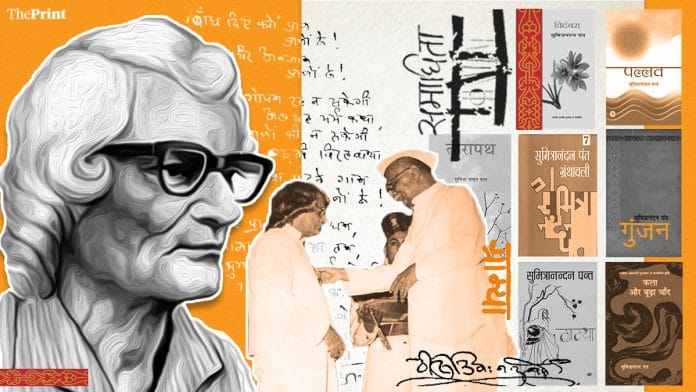One of the first names that comes to mind when one thinks of Hindi literature is that of Sumitranandan Pant. Widely referred to as the ‘third pillar of Chhayavaad’ (neo-romanticism) along with Jaishankar Prasad, Suryakant Tripathi Nirala and Mahadevi Verma, Pant was someone whose eccentricities were as interesting as his writing.
Verma noted that when she met Pant for the first time, she started laughing out loud, because until then, she had assumed, given his name, that he was a woman. The name, as also his long hair, had a story behind it.
Born Gosain Dutt, he changed his name to Sumitranandan Pant while in school as an homage to Lakshman from the Ramayan, whose mother’s name was Sumitra, while the hairstyle was inspired by French military leader Napoleon Bonaparte.
His was not the only name he changed, though. Many years later, he suggested to fellow poet Harivansh Rai Bachchan that instead of naming his son Inquilaab, he might consider Amitabh. The rest, as they say, is history. Pant is also credited with giving the national broadcaster, Doordarshan, its name.
On his 120th birth anniversary, ThePrint explores Sumitranandan Pant’s life and work.
Also read: Poet Mahadevi Verma and her undiscovered feminist legacy
A man of nature
Pant was born on 20 May 1900 in Kausani in Uttarakhand’s Almora district. His mother died soon after childbirth, while his father managed a tea estate. Pant’s love of nature and of words developed early in life. At the age of seven, he began writing poetry and songs. His childhood poems on nature are compiled in a collection titled Veena.
Famously called ‘prakriti ke sukumaar kavi” (the poet of nature), he spent many years of his life amid the hills and outdoors, which finds pride of place in his poetry. He calls the clouds ‘gagan ke gaan’ (the song of the sky), the shadow made by the sun was his beloved (sajni) and god, to him, was an artist.
Also read: Harivansh Rai Bachchan — a critic of religiosity, class system and clingy lovers
The impact of Gandhi & Marx
After completing his schooling from Almora, Pant went to Kashi to pursue higher education. However, he soon dropped out to join Mahatma Gandhi’s Satyagraha movement.
Gandhi was just one of the many prominent thought leaders who influenced Pant — others included Rabindranath Tagore, Karl Marx and Aurbindo.
Sample this ode to Gandhi from his collection Chidambara:
“Bapu! Tumse sun atma ka tejrashi aahvaahn,
Hans uthate hain rom har se, pulkit hote pran
Nahin jaanta, yug vivart mein hoga kitna jan-kshay,
Par, manushya ko satya ahimsa isht rahenge nishchay”
(Bapu ! Hearing your fiery invocation of the soul, every fibre of my being rejoices. I do not know how long mankind will endure but truth and non-violence will always be the idols of humanity)
Marxism started appearing in Pant’s poetry very subtly. Along with neo-romanticism, he became a spokesperson of progressive poetry, and his poems reflected a deep awareness of class disparity. In his collection Yugvani, he wrote:
“Shreni varg mein manav nahi vibhajit
Dhan bal se ho jahan na jan shram shoshan”
(Human beings should not be divided on the basis of caste and class, money should be earned by hard work and there shouldn’t be public labour exploitation)
Many poets imagined and recreated Bharat Mata through their poetry. Pant’s Bharat Mata (Mother India) reflects the amalgamation of Gandhism and Marxism. In his poem Bharatmata Gramvasini, he wrote:
“Bharat mata gramvasini
Kheton mein phaila hai shyamal
Dhool bhara maila sa aanchal
Ganga Yamuna mein aansu jal
Mitti ki pratima udasini”
His Bharat Mata is a rural Indian woman who works in the fields, whose clothes are dirty, whose tears form the Ganga and Yamuna, a sad statue made of the soil. He further writes that she is a migrant in her own home, as a woman often feels.
Pant was the first Hindi poet to be awarded the prestigious Jnanpith Award in 1968, which is literature’s biggest award. The poet was also awarded by Sahitya Akadami and Padma Bhushan by the Indian government. He died of a heart attack in 1977.






